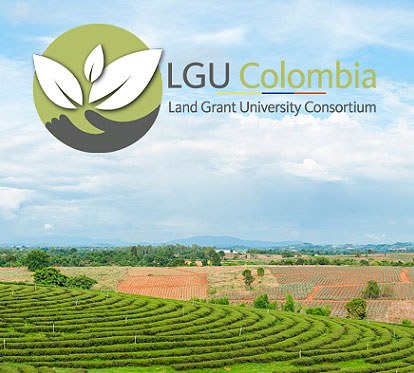The Land Grant University Colombia Consortium is a pioneering initiative of nine U.S. public and land grant universities committed to contributing to lasting peace in Colombia through rural and agricultural development.

Land Grant University Colombia Consortium
Created with the assistance of the U.S. Embassy in Bogotá, the Consortium seeks to leverage the land grant mission and expertise in applied agriculture and extension services to collaboratively help create a prosperous, inclusive and sustainable rural economy in support of Colombia's peace-building efforts.
The consortium grew out of a 2015 exploratory mission to Colombia, sponsored by the Public Affairs section of the Embassy in Bogotá, by a group of land grant universities that recognizes agriculture's potential as an important engine of growth for rural Colombia, and that rural development and agricultural economic opportunity are pillars of the post-conflict reconstruction.
The universities that form the consortium are: University of California, Davis; Cornell University; University of Florida; Michigan State University; New Mexico State University; Penn State University; Purdue University; Texas A&M University; and Washington State University.
The Consortium itself is more than a sum of its university members. It represents a unique network of opportunities with the potential to enhance engagement, develop synergies among diverse talent pools, and multiply impact.
The LGU Colombia Consortium is a unique forum for harnessing the mission and expertise of a network of U.S. land grant universities with extensive experience in agricultural research, agricultural education and extension.
The Consortium members work together to collaborate with Colombian institutions at the national and regional level in a diverse portfolio of initiatives that has the overarching objective of making transformative contributions to Colombia's agricultural and rural development.
We carry out our mission through a set of core services:
- Engage in collaborative research projects with Colombian partners that respond to local needs and problems
- Support joint teaching activities and agricultural curriculum development
- Build capacity in higher education institutions to meet educational needs at multiple levels
- Provide technical assistance to Colombian agriculture stakeholders
- Develop rural education and extension programs for rural leaders, young farmers and women
- Facilitate technology transfer and rural advisory services
- Implement exchange programs for undergraduate and graduate studies, and research
- Foster collaborations with the Consortium and between Consortium members and Colombian counterparts

